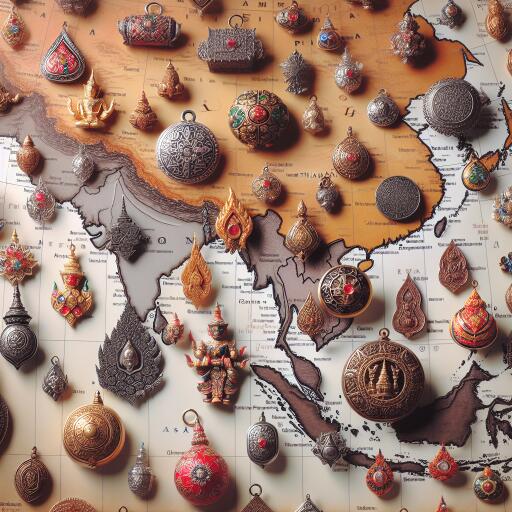Amulets: Thai Soft Power, Exported as Far as China
The cultural allure of Thai amulets is casting a spell far beyond its borders, reaching into the heart of China, where even celebrities have become ardent enthusiasts. This fascination is not the result of concerted promotional efforts but rather emerges from the genuine appeal and mystique surrounding these spiritual artifacts. The burgeoning interest in these objects has given rise to what can be termed an “auspicious economy,” significantly influencing both the Thai economy and its tourism and Buddhist commerce sectors, with the market’s value soaring into tens of billions of baht.
Amulets in Thailand have transcended their traditional religious significance to become valuable economic assets. They embody a unique blend of spirituality and materiality, attracting not only those in search of spiritual solace but also collectors and investors. This shift has seen the amulet market in Thailand flourish, with an annual trading volume worth tens of billions of baht, a figure that continues to climb, particularly among Chinese tourists. These visitors, drawn by their reverence for Buddhist principles and the allure of these sacred items, have become key players in the amulet market’s expansion.
A study conducted by the Kasikorn Research Centre in 2019 shed light on the financial magnitude of this market within Thailand, estimating its value to be between 17 billion and 23 billion baht. It’s essential to note that this estimate accounted solely for domestic sales to Thai individuals, leaving out the substantial contributions from foreign tourists and exports.
One pivotal moment in the history of Thai amulets’ international journey was their introduction to Hong Kong around 2008-2009. Thomas Patton, an anthropologist at the City University of Hong Kong, observed this development and noted the widespread intrigue and fascination among Hong Kong residents. The allure of Thai talismans and magical practices provided a new avenue for spiritual exploration and solace, capturing the imaginations of many in the city.
The appeal of Thai amulets extends into the realms of both spirituality and commerce, embodying a unique aspect of Thailand’s soft power. These objects, rooted in Buddhist tradition and believed to be imbued with protective and auspicious properties, have resonated deeply with individuals across China and beyond. Their rise in popularity underscores the growing influence of Thai culture and its spiritual heritage on a global scale, establishing a vibrant market that bridges the gap between the sacred and the economic.
In conclusion, the journey of Thai amulets from local religious artifacts to highly sought-after international commodities exemplifies the dynamic interplay of culture, religion, and economics. As they continue to enchant an ever-expanding audience globally, Thai amulets not only contribute significantly to Thailand’s “auspicious economy” but also highlight the country’s cultural richness and spiritual depth, resonating with individuals from diverse backgrounds and beliefs.
